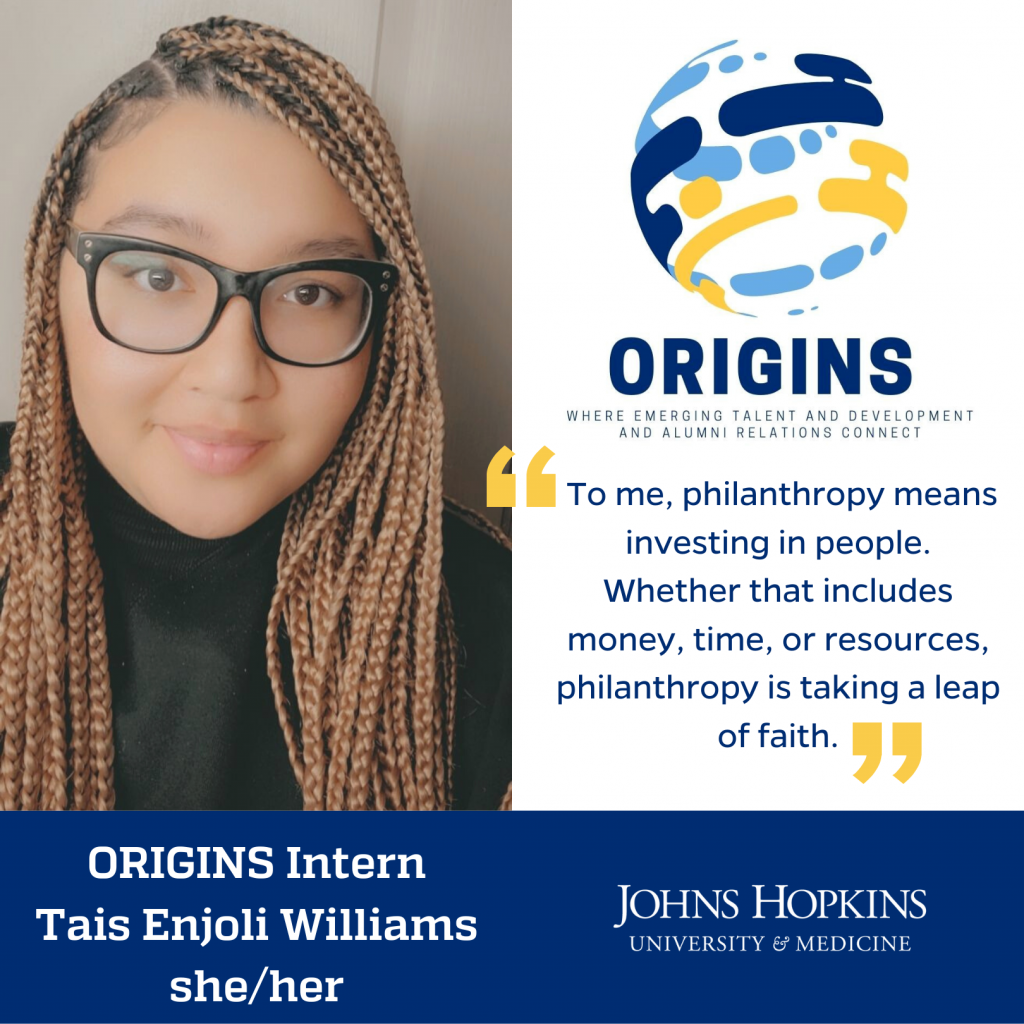Tais Williams
Tais Enjoli Williams is a rising senior at the University at Buffalo majoring in public health and minoring in political science. She is supporting Development and Alumni Relations with Krieger School of Arts and Sciences. Tais plans to take the fundraising and networking skills she built with DAR with her as she follows her passion for public policy and advocacy.
What drew you to this opportunity?
I happened to stumble upon this opportunity while looking for my first internship. What drove me to commit was the opportunity for personal and professional enrichment. Hopkins is full of valuable resources to expand my network and can provide me with a platform to make impactful change, not only in the Hopkins/Baltimore community but also in social climates worldwide. A chance to harness and grow my skill set is an opportunity to open the door for others. Being a DAR intern will transform how I think fundraising and DEI can shape a better future.
What are you most excited about during your internship?
I am most excited to learn how DAR and public health coincide. Being a public health major means I am passionate about public policy and advocacy. My understanding of fundraising and alumni development is crucial to building a skill set that fosters great connections and innovation.
What is your most memorable college experience?
I attended a protest against Allen West, on my campus, in support of BLM and allyship of the LGBTQ+ community. When they denied us access to the lecture, we peacefully protested outside until they came out. When they confronted us with violence and hate speech, we marched them off of our campus. Everyone has the right to their opinion, but as long as I am breathing, hate has no space in my environment.
Where do you want to be in 10 years, and how can this internship help you get there?
In 10 years, I want to be the CEO of my own non-profit organization. A dream of mine is the help solve the housing crisis in this nation. Every day more and more people are displaced and forgotten. This internship will help me build valuable connections with creative thinkers and learn the workings of fundraising and donor relations. Such information will prove to be invaluable for my future ambitions.
What area of advancement is of most interest?
I am most interested in educational advancement since we often regard it as the first step to a better future.
What area of Development and Alumni Relations interests you the most?
I would say alumni relations. I love everything about their work culture. Alumni relations stole my heart by building and nurturing authentic relationships and encouraging curiosity. It exhilarates me to work with those who are not afraid to challenge the status quo. Alumni relations revealed the humanitarian side of fundraising to me by seeing people for what they really are: people. Being in an environment that seeks constant growth through open and honest conversation makes me want to work ten times harder. I have loved partnering with Hopkins’ alumni relations department.
What does philanthropy mean to you?
To me, philanthropy means investing in people. Whether that includes money, time, or resources, philanthropy is taking a leap of faith. When I think of philanthropists, I think of those with the means to allocate what they have into causes that mean something to them. In a nutshell, philanthropy is a gesture of goodwill.
What excites you most about spending your summer in Baltimore?
I am most excited about meeting new people and exploring a new city.
What is your biggest take-away from what you’ve learned so far?
Our institutions have a lot more work to do toward successfully implementing diversity, equity, inclusion, and belonging (DEIB) practices. We need to sew DEIB into the fabric of our work-life instead of letting those practices function as an add-on. To remain competent, universities should learn how each demographic engages with DEIB. Hopefully, that increases transparency to help everyone understand how we can improve our policies. As society progresses, best practices should reflect that. Making these changes is difficult for large institutions like Hopkins, but we identify our blind spots through active listening. With our resources, we can rebuild policies to improve discovery and engagement.
